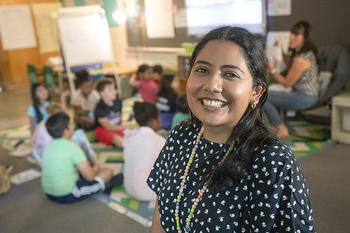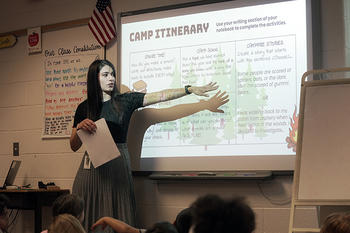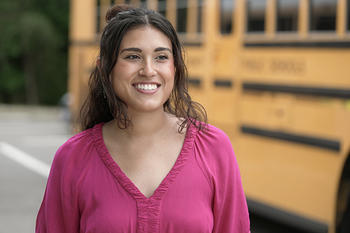Over the past year, headlines from across the United States have warned of the pending educator exodus.
The New York Times, calling it the “Great Teacher Resignation,” cited a National Education Association survey in November 2022 in which 55% of teacher respondents said they were considering leaving the profession. A 2022 study by the Joint Legislative Audit and Review Commission on behalf of the Virginia General Assembly reported that nearly all school divisions in Virginia indicated increasing difficulty in both recruiting and retaining teachers.
For Northern Virginia, George Mason University’s College of Education and Human Development’s (CEHD) award-winning Professional Development School (PDS) program is a beacon of hope.

PDS programs offer an innovative alternative to the traditional method of internships—in which a teacher candidate (students who are working toward undergraduate or graduate degrees in education) is placed into a primary or secondary school with limited collaboration between the university and school divisions.
Instead, PDS programs are developed through reciprocal partnership between universities and school divisions, in which staff and faculty on both sides work in cooperation to create effective, impactful, and immersive teaching experiences for candidates. The Elementary Education Program in CEHD has utilized the PDS model for 20 years with multiple school divisions throughout Northern Virginia.
“It’s an incredible framework to be partners in teacher preparation and professional development with our school divisions,” Audra Parker, Mason professor and academic program coordinator for elementary education, explained. “School-based teacher educators are our partners in teacher preparation—together we engage in mutually beneficial, ongoing professional learning. They keep us current in what’s happening in the classrooms, and we maintain currency in research and best practices. Together we bridge theory and practice as we support teacher candidates’ professional growth.”

Scaffoldings of support allow for these teacher candidates to grow and thrive in the classroom environment, which in turn has a long-lasting impact on retention rates for teachers, particularly those who continue to teach in public schools. The program’s emphasis on practical classroom experience along with understanding, becoming part of, and even impacting the school’s culture helps teacher candidates feel welcome and supported—and therefore more likely to stay.
“We have mentor-teachers in these schools who are program-completers who were then hired into the school,” said Charlene O’Brien, university facilitator for PDS programming. “We’re planting the seeds and watching them grow, thrive, and support the next generation.”
“I’m getting a year-long interview with a future candidate, and that candidate is learning our school culture, the expectations of the job, and is building relationships with our faculty and staff,” said Joshua Douds, MEd Educational Leadership ‘05, principal of Centreville Elementary School (CES). CES is one of the schools in the program demonstrative of its vision and mission, evident in it receiving the National Association of Professional Development School’s 2023 Exemplary PDS Award. Almost 15 of CES’s current teachers were once teacher candidates at CES.

“This award validates the work we’ve done, and gives national recognition to the PDS program, how important it is and how much better it is for teachers, schools, and districts,” Douds said.
The immersion of teacher candidates into the fabric of the classroom and the school system also allows for better education for all parties—teacher candidates, faculty, and students. “Teacher candidates from Mason bring in the newest ideas around education and their diverse perspectives, which forces us to reflect on our practices, which makes us stronger educators,” Douds explained. “And that, in turn, benefits the students.”
“The responsibility we expect of our candidates can be daunting, but because of the support and scaffolding, our students feel confident and are able to rise to those standards,” said Parker.
Teacher candidates aren't just improving the day-to-day management of classrooms and teaching; their impact extends to the systems and structures of the schools themselves. One recent community-mapping project led by teacher candidates at CES resulted in the development of school-wide daily mindfulness practices in order to improve mental health among staff, faculty, and students.
The teacher candidate who took the lead on that project is now a full-time faculty member at CES.
“Allowing our teacher candidates to spearhead this kind of innovation sends a message: ‘You help make our school better every day,’” O’Brien said. “And I just love that belief that they can do it.”
Related News
- April 15, 2024
- April 10, 2024
- April 10, 2024
- April 9, 2024
- March 25, 2024
